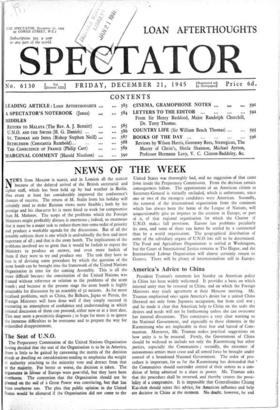NEWS OF THE WEEK
NEWS from Moscow is scarce, and in London all the scarcer because of the delayed arrival of the British secretarial and cipher staff, which has been held up by bad weather in Berlin. One event at least has considerably improved the conference's chances of success. The return of M. Stalin from his holiday will
certainly tend to make Russian views more flexible ; both by his prestige and his character h: is more fitted to work for compromise than M. Molotov. The scope of the problems which the Foreign Ministers might profitably discuss is enormous ; indeed, so enormous that it must be a major task to reduce them into some order of priority and produce a workable agenda for the discussions. But of all the possible subjects there is one which is undoubtedly the first and most important of all ; and that is the atom bomb. The implications of the problems involved are so great that it would be foolish to expect the Ministers to produce an answer, and even more foolish of them if they were to try and produce one. The task they have to face is of devising some procedure by which the question of the atom bomb can be brought into the framework of the United Nations Organisation in time for the coming Assembly. This is all the more difficult because the constitution of the United Nations was framed without reference or relation to the problems of the atom bomb ; and because at the present stage the atom bomb is highly unsuitable for discussion by an assembly of 52 nations. As for more localised problems, such as China, the Balkans, Japan or Persia, the Foreign Ministers will have done well if they simply succeed in recreating an atmosphere of confidence and understanding in which rational discussion of them can proceed, either now or at a later date. This may seem a pessimistic diagnosis ; to hope for more is to ignore the immense difficulties to be overcome and to prepare the way for unjustified disappointment.






























